- Home
- Richard Matheson
Somewhere in Time Page 9
Somewhere in Time Read online
Page 9
There again.
Lasted minutes.
Are … minutes there … minutes here?
When I … came back … adagio still playing.
Did I replay it? Can’t remember.
Really feel … peculiar.
Unreal.
1971 … feels … as 1896 did.
Not real.
Lying here … feels like …
Like it did in 1896.
As though I … have to watch myself.
Or lose it.
Funny.
Shall I … turn my head … describe a—picture on the wall?
To prove I’m here?
Feels that way.
Feeling of … impermanence.
As if … I’m really … man from 1896 … trying to reach …
—what?
Odd sensation.
Don’t resist it.
Coming.
God, I feel it coming.
Have to … stop … talking. Close my … eyes, ‘struct my …
mind.
Tell my … my …
self, my self tha’ …
Drifting.
Heavy
Feel … . … . … . … . … ..soheavy
Two
November 19, 1896
I opened my eyes to see the fire of sunset on the walls and ceiling.
At first, it didn’t register. I lay on my back without moving, head and body feeling numb, as though I’d had too much to drink. I knew I hadn’t been drinking though. This numbness was caused by something else.
I listened to the surf for minutes before the realization struck me.
The sound of it was infinitely louder than it had ever been before.
I was there.
The knowledge caused a sudden, weblike tingling in my fingertips and all across my face. I looked down at my body—at the dark suit and the pointed boots near the foot of my bed. Then I refocused my eyes and looked beyond.
Where the bureau had been, I saw a fireplace. I couldn’t see the hearth because of my position but I saw the mantel made of polished cherry wood and, as the pounding of the surf abated momentarily, heard the crackling of a fire.
Incautiously, I pushed up on my right elbow. For ten to fifteen seconds, the room swam around me darkly and I suffered the dread that I was going back.
Gradually, then, everything assumed a natural perspective and I stared at the fire. To my surprise, I saw coal burning on the grate; I had expected wood. Immediately, I saw how injudicious that would be. A hotel constructed of wood with hundreds of erratic wood fires in its rooms? It would be an invitation to catastrophe.
I looked toward the windows and received another surprise when I saw venetian blinds. I stared at them in confusion, only realizing gradually—with incredible mental sluggishness, it seemed—that, now, they were made of wood.
My gaze shifted. Instead of drapes, there were white, airy-looking curtains tied back on each side of the windows. The writing table and chair were gone. Against the wall, below the windows, stood a low, rectangular table, a lacelike scarf across its polished surface, a heavy, brass plate lying on the scarf.
I turned my head to the left. There was only one bed in the room, and the bathroom wall was gone. Where the tub and shower had stood was a massive bureau with a large, square mirror hanging above it.
I twisted around carefully and looked up at the framed print on the wall. I couldn’t see it very well. Laboredly, I turned myself and strained to my knees on the soft mattress.
The painting was as I’d remembered it except that now I could make out all the details I’d missed. An old woman was sitting in the shadows by the dog, the umbrella leaning against her legs. There were three additional figures as well, located on the right side of the painting; two men and a young girl. One of the men had his back turned away and was holding a grip in his left hand. The other was standing in a doorway, looking toward the boy and mother. My gaze dropped to the title plate on the bottom of the frame. Breaking Home Ties by Thomas Hovenden.
Holding on to the wooden headboard for support, I eased myself off the mattress and stood. As cautious as it was, my movement made the room go swirling into darkness again and I had to clutch at the headboard to keep from falling. Finally, I was compelled to slump down on the bed and sit with my eyes shut, my head feeling as though it were rolling around on my shoulders. Don’t let me lose it, I thought; but to whom I pleaded I have no idea.
After a while, the sensation dwindled and I opened my eyes again, looking at the elaborate floral design on the rug. When my head had cleared a little more, I lifted it and looked toward the bureau. One of its lower drawers was partly out and I saw a shirt inside. I stared at it in confusion. Was it mine?
Once more, comprehension came with what struck me as unbelievable slowness. The shirt, of course, was the property of whoever was renting this room. I had been fortunate enough to reach the room while he was elsewhere.
I looked at the light fixture hanging from the ceiling. Each of its four white globes was attached to the end of a curved, tubelike metal stem. Electricity, I thought. I’d known they had it, but somehow it seemed anachronistic to me.
I lowered my gaze and looked toward the closet, which was in the same place. Its door was ajar and I saw two suits hanging inside, a pair of boots below them, two hats on an upper shelf. I stared at them for several minutes until, suddenly, the thought occurred to me that the owner of these articles might, at any moment, enter the room. I had to leave.
Realization flooded through me then.
I was in the same place as Elise.
I tried to stand too quickly and, again, the spinning darkness threatened to engulf me. I would not permit myself to slump back down. Clinging to the headboard, I drew in shaking breaths until the spell of vertigo had lessened. Then I let go of the headboard and tried to stand on my own. Instantly, I had to clutch back at the heavy wood. My God, I thought. Is this the way it’s going to be? How could I hope to navigate through an entire hotel when I couldn’t even hold myself up?
Gritting my teeth, I willed myself to let go of the headboard, fought away an urge to grab at it again, and managed to stand waveringly on my legs like some uncertain infant about to try his first step. The simile is appropriate. As an 1896 man, I was, almost literally, newborn; obliged to learn the use of my limbs in this new and unfamiliar world.
At last, the quivering passed and, drawing in a breath of air to brace myself (1896 air, the thought came to me), I attempted my initial step. My legs threatened to buckle and I took my next step in a sideways manner, like a drunken man. Hastily, I took another, then another, in much the lurching fashion of Karloff’s Frankenstein monster, hands clawing out for support. I barely managed to reach the bureau without falling. Toppling against it, I leaned on its top with both hands, staring at the mirror, my reflection as undulant as though I viewed it in stirred water. I closed my eyes.
More than a minute later, I think, I opened them and took a guarded look at the mirror. The pallor of my face made me wince. I looked like someone risen from his deathbed. Was that a physical concomitant of traveling through time, I wondered?
“I think you left your blood behind,” I told the wheyfaced stranger in the mirror. He flinched at the unexpected sound of my voice, then smiled in wan agreement. I saw his Adam’s apple move as he swallowed. “You’ll make it though,” I said. He nodded with acceptance.
I looked down at the bureau top, surprised to note that I hadn’t knocked over any of the several objects on it: a gold-bordered shaving mug with a damp brush standing upside down inside it, an ivory-handled straight razor, an ornate whiskbroom, and something I didn’t recognize—what looked like a silver knife handle.
Curious, I picked it up with my right hand and looked more closely at it. I still couldn’t tell what it was. Straightening, I used my left hand to pull at a knotted ribbon and drew, from the handle, a clump of narrow fabric strings held together by the ribbon. The top strip was made of thin metal, w
ith the words I heal all wounds save those of love printed on it. I felt a stickiness on the back of one of the fabric strips and decided, after several moments, that it was some kind of hemostatic substance used on shaving nicks.
I put the strips back in the handle and set it down. I had to get out of the room before the man returned. The imagined prospect of attempting to explain my presence chilled me. How grotesque, after having succeeded in reaching 1896, to end up being arrested for breaking and entering. Or did they use that phrase?
I was able to stand without support now, albeit with difficulty. I gazed again at the harried-looking specter in the mirror. How was I to do this? I thought. Being on my feet was difficult enough. The idea of walking through endless corridors to find Elise cowed me.
I found myself looking down at the whiskbroom. The words Just a Few were inscribed on it. I picked it up and was startled to hear a gurgling sound inside. Once more my brain was leadenlike in getting the significance. Finally, I realized, however, that Just a Few referred to more than brushed-off clothes.
Again I was as ineffective as a child as I tried to unscrew the handle. I was aghast at my weakness. By the time the handle started loosening, I was convinced that I could manage nothing whatsoever in this new environment.
Slowly, I unscrewed the handle and raised the opening on the brush to my nose. The pungent smell of brandy sprang into my nostrils and behind my eyes, making me cough. I drew the flask away and waited several moments before taking a sip.
The threadlike fire of it in my throat made me gasp. A fit of coughing shook me and I almost dropped the flask. To my increased distress, now my body felt like heavy yet fragile glass, threatening to break apart at every cough. I struggled to control the spasm, leaning hard against the bureau, eyes shut, face distorted by the effort.
When the coughing finally stopped, I opened my eyes and looked at my reflection through a haze of tears. Screwing the handle back onto the brush, I set it down and rubbed my eyes. My reflection cleared. I still looked shaken but there was a trace of color in my cheeks now. No wonder brandy is administered for heart attacks, I thought. I could feel it drawing me together like some caustic glue as I looked down at the partly open drawer. Next to the shirt was an open box of plated collar buttons; next to that, a magazine entitled The Five Cent Wide Awake Library.
I straightened up. The brandy had accomplished much. My head felt measurably less ponderous and my legs seemed to contain bone and fiber instead of gelatin. Breath wavered in me as I realized that, finally, I might make my way to her.
I checked myself a last time in the mirror. Tie on straight, clothes properly adjusted. Slowly, I reached up to pat my hair in the spots where lying on the pillowcase had caused it to stick up; checked my inside coat pocket and found the money still intact. Then I filled my lungs with the warm air of the room, turned from the bureau, and approached the door with small, guarded steps. I still felt somewhat dizzy but at least I could control my legs now.
I closed my hand around the metal knob, turned it, and pulled at the door. It didn’t open. Locked, of course, I thought with a reproachful smile at my naivete for not anticipating that it would be. I looked down for the means to unlock it.
There weren’t any
The problem was so unexpected that I couldn’t deal with it. Once more, I was newborn, stunned and baffled.
Had I traveled seventy-five years to be confounded by a simple door lock?
I was not aware, at first, that I was shaking my head. All I was conscious of was one stricken thought: This is impossible.
Yet it wasn’t. It was right in front of me. The man had left the room, locked the door from the outside with a skeleton key—and made the room a prison for me.
I have no idea how long I stared at that door in blank diablement, waiting for an answer; incapable of understanding that there was none. Finally, it burst inside me and, with a dumbfounded groan, I turned and walked stiffly back into the room. Crossing to the bureau, I opened its drawers one by one (darkness flared before my eyes each time I had to bend), hoping desperately that the man had left a spare key.
He hadn’t. Worse, there was nothing with which I might unlock the door—no scissors, nail file, penknife, anything. Again, the groan. This was impossible!
Half-staggering, I hurried to the window and looked outside. No fire escape either. I groaned again as I gazed down at the curving walk below, the broad, green lawns, two asphalt tennis courts where the north end of the parking lot had been, and, startling to me, even in my state, the ocean no more than sixty feet beyond the rear of the hotel.
I stared at the narrow beach. It was gilded with an orange glow, surf pounding frothingly against it. I started as a couple with two children drifted into view. The sight of them walking on the sand made my heartbeat jump because they were the first visible residents of 1896 I had seen. A short time before, none of them had been alive, unless the children were, eking out their final days. Now they moved before my eyes, embodied. If I had doubted, prior to that moment, where I was, the sight of the man’s tall hat and cane, the woman’s bonnet and full-length skirt, and the children’s outfits would have made it clear to me that 1971 was far away.
I whirled with a cry of outrage. This was maddening! I had to find Elise! Stumbling to the door, I turned the knob and yanked it furiously. The effort made me giddy, forcing me to lean against the dark wood of the door and press my forehead to it. I was obviously too enervated to break from the room. Despondent, I began to hit the door with the side of my fisted right hand, hoping that a porter might be somewhere in the corridor and let me out.
No porter came. I began to shiver and, for close to a minute, feared that I was losing control of myself. This turn of events was too insane. If I waited for the man’s return, he’d surely inform hotel authorities. I might, initially, flee but they’d be sure to find me when I sought Elise. There would be questioning, arrest, perhaps imprisonment. God! To be thrown in jail after everything I’d gone through!
I turned around abruptly as the idea struck me, doubtless born of desperation. It was the first productive thought I’d managed since arriving in 1896. I crossed unevenly to the bureau, and picked up the ivory-handled razor. Returning to the door, I shook the blade from its sheath and started cutting at the doorjamb by the latch. Heaven help me if he comes back now, I thought. I didn’t let the risk deter me though, continuing to slice at the jamb with the blade edge, cutting away strips of it and, periodically, pulling at the door to see if I could break it loose. I ignored the pulse of shadows at my eyes. I had to find Elise. Nothing else mattered.
Minutes later, with a splintering crash, I yanked the door free of its frame and peered into the corridor, heart pounding. No one was in sight. I glanced down at the shavings on the rug. The man would think, at first, that he’d been burglarized.
I turned and tossed the razor across the room; it bounced off the mattress and thumped down on the rug. Poor man, I thought, smiling guiltily as I shut the door behind me. Here was a mystery he’d never solve; nor anyone else for that matter. Someone had cut their way out of his locked room? The sheer John Dickson Carr-ish madness of it almost made me laugh as I started up the hallway. Guests and staff would be discussing this enigma for some time to come.
I experienced a momentary premonition as it occurred to me that, already, I had imposed my presence on 1896, causing physical damage and creating a problem with no solution. Was that allowed? I wondered.
I had to let the worry pass; there was no way to deal with it. I had to find Elise; could permit myself no other concern.
I hadn’t turned to the right as I’d exited the room. I don’t know why; it was the simplest route. Perhaps I feared to come into contact with people too soon. There’d be an elevator operator; I assumed the elevator to be there. Even if it weren’t and I used the staircase there was bound to be someone on the patio. For some reason, the idea of being close to anyone unnerved me and I wanted to avoid the necessity as long as possi
ble.
Is this what ghosts experience? I wondered. A dread of accosting people lest those people look directly through them and they lose their fragile illusion of still being alive? Even the sight of that couple and their children on the beach had disquieted me. It is one thing to stand in a room looking at furniture and objects which bespeak their period. It is another to be exposed to living beings from that time. I wondered how I’d react when I actually had to speak to one of them—look them in the eye and feel their flesh-and-blood proximity.
How would I react when I was actually in her presence?
The walls of the narrow corridor drifted past me blurringly. I seemed to be advancing in a dream. Would I get lost again as I had that day? What day? The countering question struck, assailing logic. There was no way to answer it. In memory, that day was in the past. Yet I was far more distant in the past now.
I thrust away the contradiction before it could disorient my mind. Passing a hose reel hanging on the wall, I touched it, verifying its existence and my own. This was the present from which all plans and memories must evolve. I looked at a covered barrel as I passed it, looked at buckets and axes hanging on the walls. Why are they here? I remember thinking. When I’d woken, there’d been sprinkler heads in the ceiling.
Let it go, I told myself. It was difficult enough to feel like a real person in a real place; I had to focus all my concentration on that. When I trudged past an ornate mirror on the wall, I actually felt a burst of relief to note the solidity of my reflection.

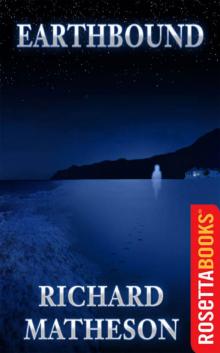 Earthbound
Earthbound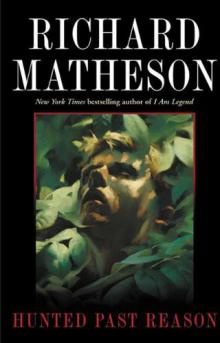 Hunted Past Reason
Hunted Past Reason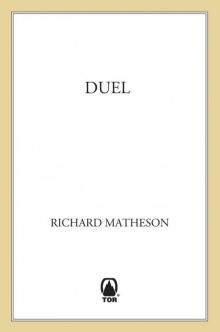 Duel: Terror Stories
Duel: Terror Stories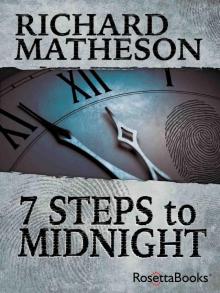 7 Steps to Midnight
7 Steps to Midnight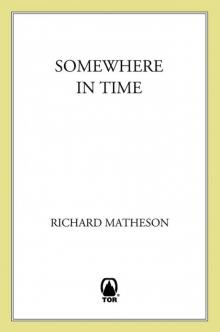 Somewhere in Time
Somewhere in Time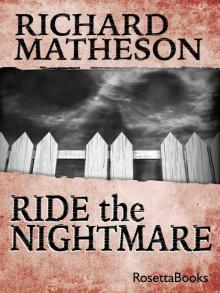 Ride the Nightmare
Ride the Nightmare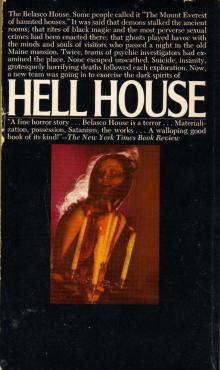 Hell House
Hell House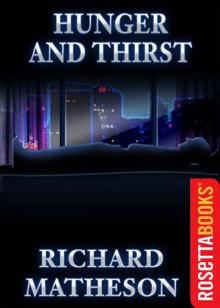 Hunger and Thirst
Hunger and Thirst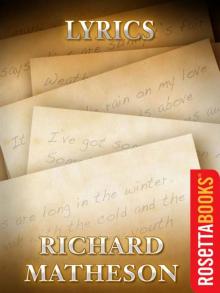 Lyrics
Lyrics Other Kingdoms
Other Kingdoms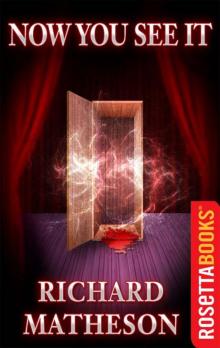 Now You See It . . .
Now You See It . . .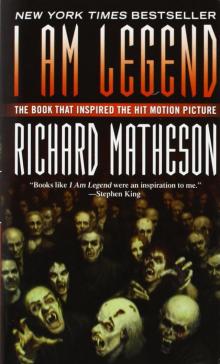 I Am Legend
I Am Legend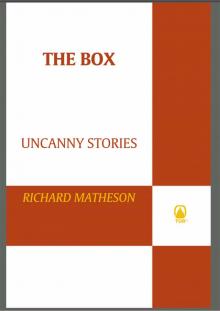 The Box: Uncanny Stories
The Box: Uncanny Stories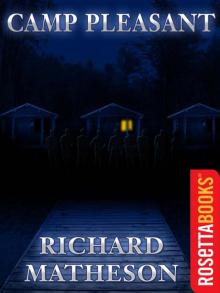 Camp Pleasant
Camp Pleasant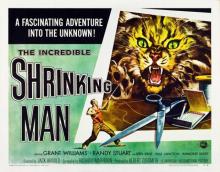 The Incredible Shrinking Man
The Incredible Shrinking Man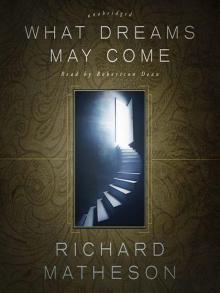 What Dreams May Come
What Dreams May Come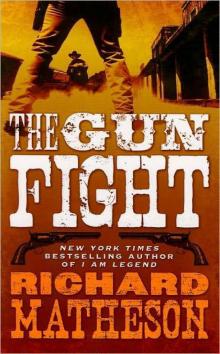 The Gun Fight
The Gun Fight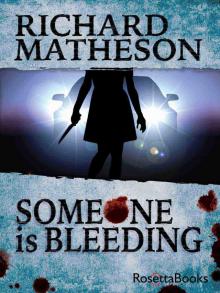 Someone Is Bleeding
Someone Is Bleeding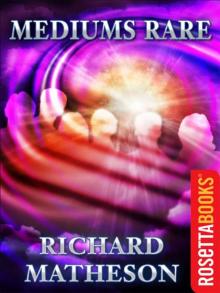 Mediums Rare
Mediums Rare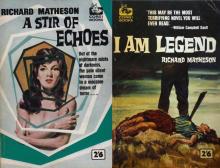 A Stir of Echoes
A Stir of Echoes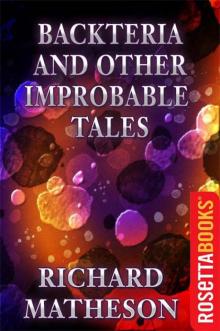 Backteria and Other Improbable Tales
Backteria and Other Improbable Tales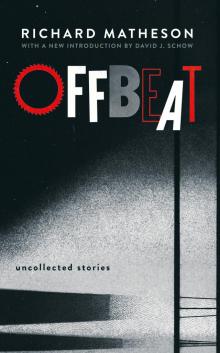 Offbeat: Uncollected Stories
Offbeat: Uncollected Stories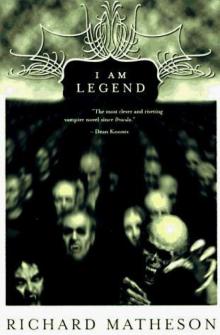 I Am Legend and Other Stories
I Am Legend and Other Stories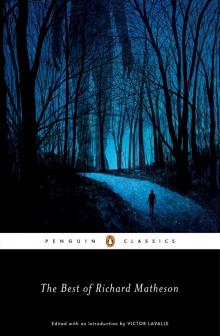 The Best of Richard Matheson
The Best of Richard Matheson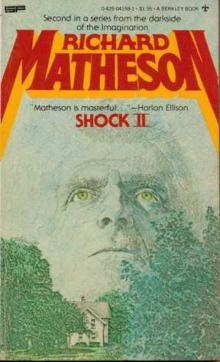 Shock II
Shock II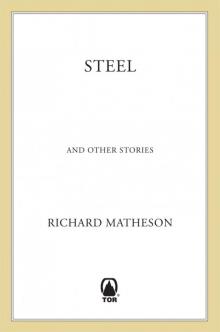 Steel: And Other Stories
Steel: And Other Stories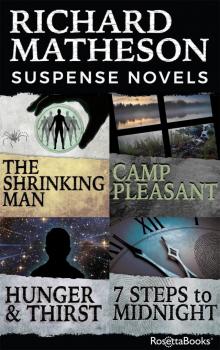 Richard Matheson Suspense Novels
Richard Matheson Suspense Novels The Link
The Link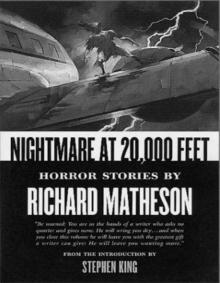 Nightmare At 20,000 Feet
Nightmare At 20,000 Feet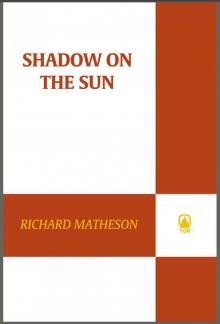 Shadow on the Sun
Shadow on the Sun![Steel and other stories [SSC] Read online](http://i1.bookreadfree.com/i/03/21/steel_and_other_stories_ssc_preview.jpg) Steel and other stories [SSC]
Steel and other stories [SSC]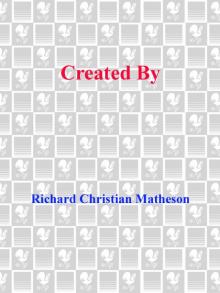 Created By
Created By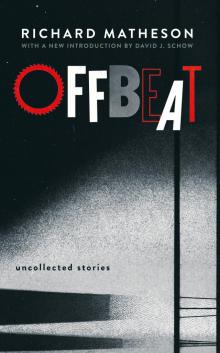 Offbeat
Offbeat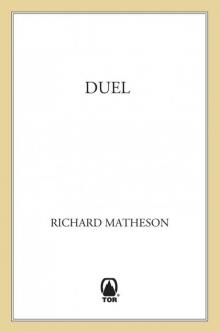 Duel
Duel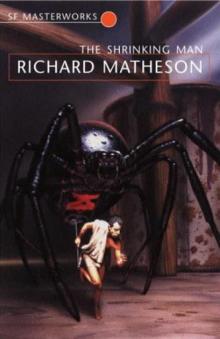 The Shrinking Man
The Shrinking Man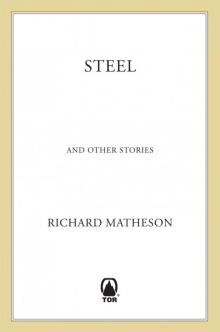 Steel
Steel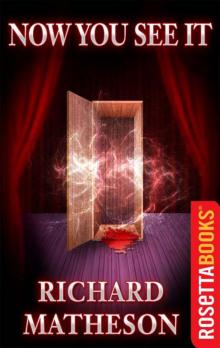 Now You See It
Now You See It